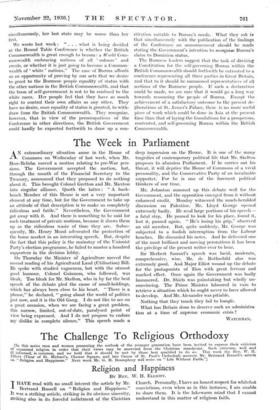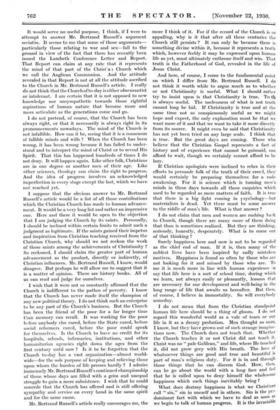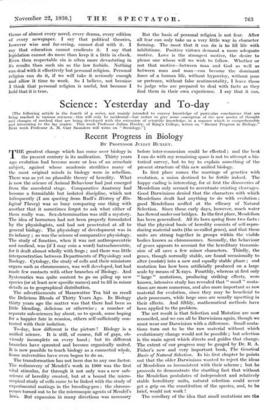The Challenge To Religious Orthodoxy
[In this series men and women presenting the outlook of the younger generation have been invited to express their criticism of organized religion in order that their views may be answered from the Christian standpoint. Such criticism, well and ill informed, is common, and we hold that it should be met by those best qualified to do so. This week the Rev. W. H. Elliott (Vicar of St. Michael's, Chester Square, and late Canon of St. Paul's Cathedral) answers Mr. Bertrand Russell's article en "Religion and Happiness." Next week Mr. G. M. Boumphrey will write on "Life Without Faith."]
Religion and Happiness
By REV. W. H. ELmorr.
T HAVE read with no small interest the article by Mr. -1- Bertrand Russell on " Religion and Happiness." It was a striking article, striking in its obvious sincerity, striking also in its forceful indictment of the Christian
Church. Personally, I have an honest respect for whitehot convictions, even when as in this instance, I am unable to share them. It is the lukewarm mind that I cannot understand in this matter of religious faith.
It would serve no useful purpose, I think, if I were to attempt to answer Mr. Bertrand Russell's argument seriatim. It seems to me that some of those arguments— particularly those relating to war and sex—fall to the ground in view of the fact that there has recently been issued the Lambeth Conference Letter and Report. That Report can claim at any rate that it represents the mind of that part of the Christ's, Church which we call the Anglican Communion. And the attitude revealed in that Report is not at all the attitude ascribed to the Church in Mr. Bertrand Russell's article. I really do not think that the Church of to-day is either obscurantist or intolerant. I am certain that it is not opposed to new knowledge nor unsympathetic towards those rightful aspirations of human nature that become more and more articulate as the generations come and go.
I do not pretend, of course, that the Church has been always right, or that it necessarily is always right in its pronouncements nowadays. The mind of the Church is not infallible. How can it be, seeing that it is a consensus of fallible minds and wills ? When the Church has been wrong, it has been wrong because it has failed to under- stand and to interpret the mind of Christ or to reveal His Spirit. That this has happened hundreds of times I do not deny. It will happen again. Like other folk, Christians are in one degree or another men of their age. Like other sciences, theology can claim the right to progress. And the idea of progress involves an acknowledged imperfection in every stage except the last, which we have not reached yet.
I suppose that the obvious answer to Mr. Bertrand Russell's article would be a list of all those contributions which the Christian Church has made to human advance- ment. It would be a very long list and rather an impressive one. Here and there it would be open to the objection that I am judging the Church by its saints. Personally, I should be inclined within certain limits to admit such a judgment as legitimate. If the saints gained their impetus and inspiration from Christian teaching received from the Christian Church, why should we not reckon the work of those saints among the achievements of Christianity ? So reckoned, I should claim the greater part of human advancement as the product, directly or indirectly, of Christian influences. Mr. Bertrand Russell, I know, would disagree. But perhaps he will allow me to suggest that it is a matter of opinion. There are history books. All of us can read and judge for ourselves.
I wish that it were not so constantly affirmed that the Church is indifferent to the pathos of poverty. I know that the Church has never made itself the champion of any new political theory. I do not think such an enterprise to be any part of the Church's business. But the Church has been the friend of the poor for a far longer time than memory can recall. It was working for the poor before anybody else cared, before the State cared, before social reformers cared, before the poor could speak for themselves. Is the Church to have no credit for its hospitals, schools, infirmaries, institutions, and other humanitarian agencies right down the ages from the first century until now ? Is it to be forgotten that the Church to-day has a vast organization—almost world- wide—for the sole purpose of keeping and relieving those upon whom the burden of life presses hardly ? I admire immensely Mr. Bertrand Russell's continued championship of those whose days are filled with a grim and unequal struggle to gain a mere subsistence. I wish that he could concede that the Church has offered and is still offering sympathy and service on every hand in the same spirit and for the same cause.
Mr. Bertrand Russell's article really encourages me, the
more I think of it. For if the record of the Church is so appalling, why is it that after all these centuries the Church still persists ? It can only be because there is something divine within it, because it represents a truth which, however feebly it may be expressed upon human life as yet, must ultimately enthrone itself and win. That truth is the Fatherhood of God, revealed in the life of Jesus Christ.
And here, of course, I come to the fundamental point on which I differ from Mr. Bertrand Itne.sP11. I do not think it worth while to argue much as to whether or not Christianity is useful. What I should rather try to insist upon is that Christianity is true. Tn th is always useful. The uselessness of what is not truth cannot long be hid. If Christianity is true and at the same time not so conspicuously useful as we might hope and expect, the only explanation must be that we want more of it and that we want to take it more directly from its source. It might even be said that Christianity has not yet been tried on any large scale. I think that is true. But the great days are coming. Those who believe that the Christian Gospel represents a fact of history and of experience that cannot be gainsaid, can afford to wait, though we certainly cannot afford to be lazy.
If Christian apologists were inclined to relax in their efforts to persuade folk of the truth of their creel, they would certainly be preparing themselves for a rude awakening. For it is science which is turning men's minds in these days towards all those enquiries which used to be regarded as mere matters of faith. It is true that there is a big fight coming in Psychology—but materialism is dead. Yet there must be some answer to the riddle of man's life. What is that answer ?
I do not claim that men and women are rushing bask to Church, though there are many more of them doing that than is sometimes realized. But they are thinking, seriously; honestly, desperately. What is to come out of that thinking ?
Surely happiness here and now is not to be regarded as the chief end of man. If it is, then many of the noblest lives have been inspired by sadly mistaken motives. Happiness is found so often by those who are not looking for it and missed by those who are. To me it is much more in line with human experience to say that life here is a sort of school time, during which we learn, not always easily or pleasantly, lessons that are necessary for our development and well-being in the long range of life that awaits us hereafter. But then, of course; I believe in immortality. So will everybody someday.
I do not mean that from the Christian standpoint human life here should be a thing of gloom: I do not regard this wonderful world as a vale of tears or our life in it as a dreary probation. Men thought so once, I know, but they have grown out of such strange imagina- tions now. The Church does not teach that. Whether the Church teaches it or not Christ did not teach it. Christ was no " pale Galilean," and life, where He touched it, did not grow grey with His breath. The love of whatsoever things are good and true and beautiful is part of man's religious duty. For it is in and through those things that he can discern God. How, then, can he go about the world with a long face and feel that he is called upon to deny himself the wholesome happiness which such things inevitably bring ?
What does destroy happiness is what we Christians call " sin," sin in oneself and in others. Sin is the pr.!. dominant fact with which we have to deal as soon as we begin to talk of human progress. It is the invariable
theme of almost every novel, every drama, every edition of every newspaper. I say that political theories, however wise and far-seeing, cannot deal with it. I say that education cannot eradicate it. I say that legislation cannot do more than keep it a little in check. Even then respectable sin is often more devastating in its results than such sin as the law forbids. Nothing can deal with it effectively but personal religion. Personal religion can do it, if we will take it seriously enough and allow it time to work. So I believe, not because I think that personal-religion is useful, but because I hold that it is true.
But the basis of personal religion is not fear. After all fear can only take us a very little way in character forming. The most that it can do is to fill life with inhibitions. Positive virtues demand a more adequate motive. Love is the strongest motive, the desire to please one whose will we wish to. follow. Whether or not that motive—between man and God as well as between man and man—can become the dominant force of a human life, without hypocrisy, without pose or pretence, without false sentimentality, I leave those to judge who are prepared to deal with facts as they find them in their own experience. I say that it can.




















































































 Previous page
Previous page